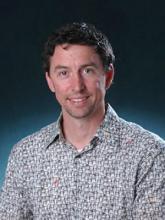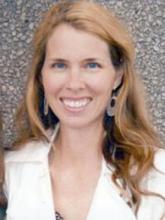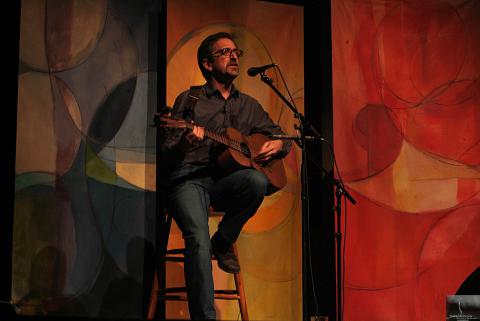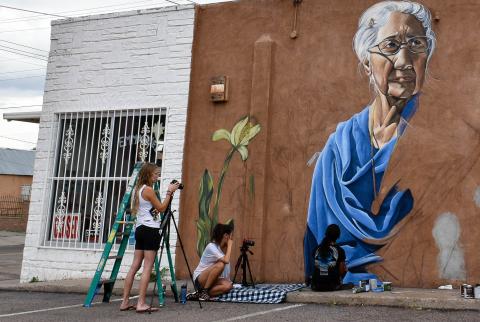Creative framing and storytelling of issues surrounding climate change through video, theatre, dance, and writing can connect a wider audience to the deep and pressing need to address climate change. Project leaders Max Boykoff (Associate Professor, Environmental Studies; CIRES Fellow), Rebecca Safran (Associate Professor, Ecology and Evolutionary Biology), Beth Osnes (Associate Professor, Department of Theater and Dance) and Phaedra Pezzullo (Associate Professor, Department of Communication) have been producing events and classes over the past six years under the banner of the ‘Inside the Greenhouse’. Support for this work catalyzes creative climate communication and builds capacity among CU Boulder undergraduate and graduate students in particular. Our efforts to engage our students, those working at the science-policy interface, and the public alike seek to help concerned make climate change meaningful in the lives of everyday people. Students are involved directly and collaboratively connecting work in the classroom to applied contexts.
 Maxwell Boykoff is the Director of the Center for Science and Technology Policy Research, which is part of the Cooperative Institute for Research in Environmental Sciences at the University of Colorado Boulder. He also is an Associate Professor in the Environmental Studies program and is Adjunct faculty in the Geography Department. In addition, Max is a Senior Visiting Research Associate in the Environmental Change Institute at the University of Oxford. He holds a Ph.D. in Environmental Studies from the University of California-Santa Cruz and Bachelor of Sciences in Psychology from The Ohio State University. Max's research and creative work focuses on cultural politics and environmental governance, creative climate communications, science-policy interactions, disaster risk reduction and climate adaptation, and he has experience working in varied cultural, socio-economic and political contexts around the world.
Maxwell Boykoff is the Director of the Center for Science and Technology Policy Research, which is part of the Cooperative Institute for Research in Environmental Sciences at the University of Colorado Boulder. He also is an Associate Professor in the Environmental Studies program and is Adjunct faculty in the Geography Department. In addition, Max is a Senior Visiting Research Associate in the Environmental Change Institute at the University of Oxford. He holds a Ph.D. in Environmental Studies from the University of California-Santa Cruz and Bachelor of Sciences in Psychology from The Ohio State University. Max's research and creative work focuses on cultural politics and environmental governance, creative climate communications, science-policy interactions, disaster risk reduction and climate adaptation, and he has experience working in varied cultural, socio-economic and political contexts around the world.
 Beth Osnes is an Associate Professor of Theatre and Environmental Studies at the University of Colorado. She is co-director of Inside the Greenhouse, an initiative for creative communication on climate. She recently toured an original musical Shine to cities in the Rockefeller Foundation 100 Resilient Cities Initiative to facilitate local youth voices in resilience planning, and her book on this Performance for Resilience: Engaging Youth on Energy and Climate through Music, Movement, and Theatre was recently published. Open Source Materials for using Shine to engage youth are available here. She is currently developing a method towards vocal empowerment for young women that she is researching in Guatemala, Tanzania and the USA. Her book Theatre for Women’s Participation in Sustainable Development includes her work specific to gender equity in Panama, Guatemala, India, Nicaragua and the Navajo Nation. She is featured in the award-winning documentary Mother: Caring for 7 Billion.
Beth Osnes is an Associate Professor of Theatre and Environmental Studies at the University of Colorado. She is co-director of Inside the Greenhouse, an initiative for creative communication on climate. She recently toured an original musical Shine to cities in the Rockefeller Foundation 100 Resilient Cities Initiative to facilitate local youth voices in resilience planning, and her book on this Performance for Resilience: Engaging Youth on Energy and Climate through Music, Movement, and Theatre was recently published. Open Source Materials for using Shine to engage youth are available here. She is currently developing a method towards vocal empowerment for young women that she is researching in Guatemala, Tanzania and the USA. Her book Theatre for Women’s Participation in Sustainable Development includes her work specific to gender equity in Panama, Guatemala, India, Nicaragua and the Navajo Nation. She is featured in the award-winning documentary Mother: Caring for 7 Billion.
Becca Safran is an Associate Professor in the Department of Ecology and Evolutionary Biology at the University of Colorado-Boulder. As an evolutionary biologist, Safran's interests are focused on the formation of new species. Her research group works on a variety of projects related to the physiological, behavioral and ecological and climate factors that influence genomic divergence among closely related populations. Funded by the National Science Foundation through several grants including CAREER award, Safran's research has appeared in Science, Current Biology, and Trends in Ecology and Evolution and many other publications related to evolutionary ecology and genetics. Each fall Safran has taught a course on the interface of climate change and filmmaking where students are asked to present their views on climate change in several 5-minute short films.
Phaedra Pezzullo is an Associate Professor of the Department of Communication in the College of Media, Communication & Information, as well as an Associate Faculty member of Environmental Studies and an Affiliate Faculty member of Media Studies, at the University of Colorado Boulder, USA. She earned her MA and PhD in Communication Studies with a certificate in Cultural Studies at the University of North Carolina Chapel Hill, as well as a BS in Natural Resources and a BA in Social Thought and Political Economy from the University of Massachusetts Amherst. In addition to over thirty articles and chapters, Pezzullo authored Toxic Tourism: Rhetorics of Travel, Pollution and Environmental Justice (University of Alabama Press, 2007), which won four book awards, including the Jane Jacobs Urban Communication Book Award and the Christine L. Oravec Research Award in Environmental Communication. Pezzullo also has coauthored three editions of the award-winning textbook, Environmental Communication and the Public Sphere (Sage, 2016, 2018, 2021, with three-time Sierra Club president Robert Cox), coedited Green Communication and China (2020, MSU Press), coedited Environmental Justice and Environmentalism: The Social Justice Challenge to the Environmental Movement (MIT Press, 2007) and edited Cultural Studies and the Environment, Revisited (Routledge, 2010). She also is a founding co-director of the Just Transition Collaborative and C3BC (Center for Creative Climate Communication & Behavior Change). For more information, see her website: https://phaedracpezzullo.com/
Climate Communications (films, interview footage, creative works)
Courses Offered at the University of Colorado
- Climate Change and Film (ATLS 3519/EBIO 4460) offered in Fall semesters by Safran
Professor Rebecca Safran has been teaching ‘Climate and Film’ in the Ecology and Evolutionary Biology department since Fall 2009. Here, students explore the science of climate change through the process of producing short films.
- Creative Climate Communication (ENVS 3173/THTR 4173) offered in Spring semesters by Boykoff and Osnes.
 Professors Beth Osnes and Max Boykoff teach an undergraduate upper division course with the objective of helping a cross-disciplinary group of students to understand, appreciate, and develop narratives or multimodal compositions - through performances, art, weblogs, and films. The interdisciplinary approach draws on each of their capabilities and interests to help students that seek to capture the complexity and dynamism of multi-scale and contemporary climate science, policy and politics.
Professors Beth Osnes and Max Boykoff teach an undergraduate upper division course with the objective of helping a cross-disciplinary group of students to understand, appreciate, and develop narratives or multimodal compositions - through performances, art, weblogs, and films. The interdisciplinary approach draws on each of their capabilities and interests to help students that seek to capture the complexity and dynamism of multi-scale and contemporary climate science, policy and politics.
For a more detailed description and to access short films created by each class, please follow this link.
Public Events
 These events are used to engage a wide variety of area students in effective communication strategies for climate related issues as well as integrate better the coursework and skill set of our climate communication students into a larger public production. We have thus far hosted James Balog (Chasing Ice), the Climate Wise Women, Andrew Revkin, Nani Chacone and Winona LaDuke. To see upcoming events and learn more about past events held, check out our Events and News page.
These events are used to engage a wide variety of area students in effective communication strategies for climate related issues as well as integrate better the coursework and skill set of our climate communication students into a larger public production. We have thus far hosted James Balog (Chasing Ice), the Climate Wise Women, Andrew Revkin, Nani Chacone and Winona LaDuke. To see upcoming events and learn more about past events held, check out our Events and News page.
Internship Program
We launched our internship program in 2009. Students from the Climate Change and Film Course participate in a juried end-of-term film festival. The first prize winners have been able to participate in film and science internships all over the world including producing films about habitat fragmentation in Australia, working on the issue of fire management in forests, and producing films about a native american mural artist / social justice activis. Follow this link to learn more.
